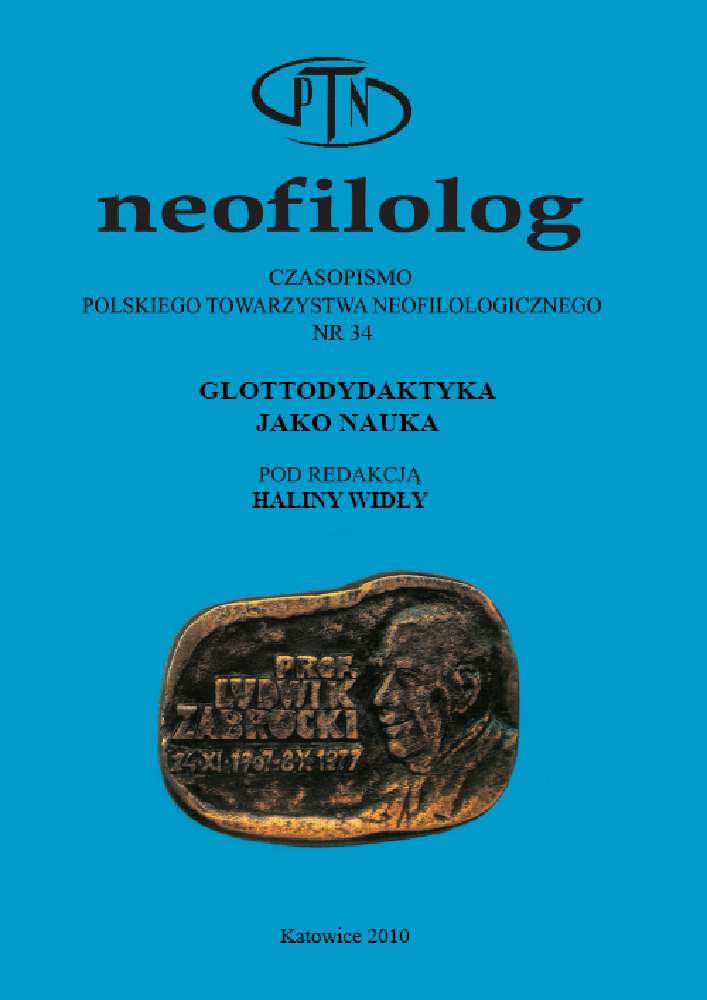Abstract
An individual case study is a research procedure and at the same time a practical approach which makes it possible to apply a variety of data gathering instruments. One such instrument is dialogue, which is described in this article as a tool meant for the diagnosis and treatment of difficulties in foreign language learning as experienced by students with special educational needs who have disturbed development in their native language.
References
Borowiec, H. 2007. „Kategorie interpretowania rzeczywistości w języku dzieci”. (w) T. Woźniak i A. Domagała (red.). Jęz yk, interakcja, zaburzenia mowy. Metodologia badań. Lublin: Wydawnictwo UMCS, seria: Mowa. Teoria – Praktyka. Tom 2/2007, str.: 107 – 132.
Barth, B. M. 1993. Le savoir en construction. Former à une pédagogie de la compréhension. Paris: Retz.
Buber, M. 1992. Ja i Ty. (przekł. Jan Doktór). Warszawa: Instytut Wydawniczy PAX. str.: 39 – 126.
Feuille d’IF nr 18 (Revue d’échanges, de réflexions et d’informations autour de la gestion mentale éditée par Initiative et Formation Belgique). 2009. Le dialogue pédagogique, témoignages et réflexions (red. P.-P. Delvaux).
Gaté, J. P. 2000. Les entretiens métacognitifs à visée pédagogique: vers une clinique éducationnelle. (w) Gestion mentale et mobilité de la pensée. Actes du colloque international de Gestion mentale. Rimouski, 14 – 16 août 2000, str.: 109 – 133.
Karpińska-Szaj, K. 2008. „Nauczyciel języka obcego jako terapeuta mowy”. (w): Jaroszewska, A i M. Lorenc (red.) Kultury i jęz yki: poznawać – ucz yć się – nauczać. Księga Jubileuszowa dla Pani Profesor Elżbiety Zawadzkiej-Barnik. Warszawa: Wydawnictwo Uniwersytetu Warszawskiego, str.: 61 – 70.
Karpińska-Szaj, K. 2009. « Autour de la compétence d’apprentissage: les
pratiques transferogènes pour les élèves en difficulté du langage » (w) Szymankiewicz, K. i J. Zając (red.) Développer les compétences multiples chez
l’enseignant et chez l’apprenant en classe de langue. Warszawa: Wydawnictwo Uniwersytetu Warszawskiego – w druku.
Klus-Stańska, D. 2002. Narracje w szkole. (w) J. Trzebiński (red.). Narracja jako sposób rozumienia świata. Gdańsk: Gdańskie Wydawnictwo Psychologiczne, str.: 189 – 220.
La Garanderie, A. de 1984. Le dialogue pédagogique avec l’élève. Paris: Le Centurion.
La Garanderie A. de 2000. « Projet de sens et mouvements ». (w): Actes du Colloque International de Gestion Mentale Gestion mentale et mobilité de la pensée, Rimuski 14 – 16 août 2000. Paris-Orsay: Institut International de Gestion Mentale, str.: 15 – 40.
Lewowicki, T. 1977. Indywidualizacja kształcenia. Dydaktyka różnicowa. Warszawa: Państwowe Wydawnictwo Naukowe.
Lévesque, J.-Y. 2000. « Gestion mentale, enseignement stratégique et actualisation du potentiel intellectuel: fondement et convergences ». (w): Actes du
Colloque International de Gestion Mentale Gestion mentale et mobilité de la pensée, Rimuski 14 – 16 août 2000. Paris-Orsay: Institut International de Gestion Mentale, str.: 157 – 192.
Łobocki, M. 2009. Metody i techniki badań pedagogicznych. Kraków: Oficyna Wydawnicza Impuls.
Meirieu, Ph. 2003 [1996]. Frankenstein pédagogue. Paris: ESF éditeur.
Meirieu, Ph. 2004 [1985]. L’école: mode d’emploi – Des « méthodes actives » à la « pédagogie différenciée ». Paris: ESF éditeur.
Nęcka, E. 2003. Inteligencja. Geneza – Struktura – Funkcje. Gdańsk: Gdańskie Wydawnictwo Psychologiczne. Seria: Postępy Psychologii.
Ostrowska, U. 2000. Dialog w pedagogicznym badaniu jakościowym. Kraków: Oficyna Wydawnicza Impuls.
Pawlak, M. 2009. „Metodologia badań nad strategiami uczenia się”. (w): M. Pawlak (red.) Metodologia badań w jęz ykoznawstwie stosowanym. Neofilolog 32: 65 – 84.
Perraudeau, M. 1998. Echanger pour apprendre: l’entretien critique. Paris: Armand Colin.
Stachlewicz, K. 2003. Fenomenologia a dialog. (w): J. Baniak (red.) Filozofia dialogu. Tom 1. Drogi i formy dialogu, str.: 47 – 59.
Tardif, J. 1999. Le transfert des apprentissages. Montréal: Les Editions Logiques.
Vermersch, P. 1994. L’entretien d’explication. Paris: E.S.F.
Vermersch, P. 1999. « Pour une psychologie phénoménologique ». Psychologie Française 44/1: 7 – 18.
Wiśniewska, D. 2009. « Dialog jako przestrzeń miedzy badaniem, poznaniem a rozwojem nauczyciela » (w) J. Nijakowska (red.). Jęz yk – Poznanie – Zachowanie.
Perspektywy i wyzwania w studiach nad prz yswajaniem jęz yka obcego. Łódź: Wydawnictwo Uniwersytetu Łódzkiego, str.: 283 – 298.
Wygotski, L. S. 1989 [1966]. Myślenie i mowa. Warszawa: PWN.
http://www.ifbelgique.be/ (DW: 14.10.2009)
http://www.iigm.org/ (DW: 14.10.2009)
http://www.conaisens.org/ (DW: 14.10.2009)
http://www.signesetsens.eu/ (DW: 14.10.2009)
License
Copyright (c) 1970 Katarzyna Karpińska-Szaj

This work is licensed under a Creative Commons Attribution-NoDerivatives 4.0 International License.
Authors
Authors of texts accepted for publication in Neofilolog are required to complete, sign and return to the Editorial team’s office the Agreement for granting a royalty-free license to works with a commitment to grant a CC sub-license.
Under the agreement, the authors of the texts published in Neofilolog grant Adam Mickiewicz University in Poznań a non-exclusive, royalty-free license and authorize the use of Attribution-NoDerivatives 4.0 International (CC BY-ND 4.0) Creative Commons sub-license.
The authors retain the right to the free disposal of the work.
Users
Interested Internet users are entitled to use works that have been published in Neofilolog since 2017, under the following conditions:
▪ attribution – obligation to provide, together with the distributed work, information about the authorship, title, source (link to the original work, DOI) and the license itself.
▪ no derivatives – the work must be preserved in its original form. Without the author's consent, it is not possible to distribute the modified work in the form of translations, publications, etc.
Copyrights are reserved for all texts published since 2017.
Miscellaneous
Adam Mickiewicz University in Poznań retains the property right as a whole (layout, graphic form, title, cover design, logo etc.).
